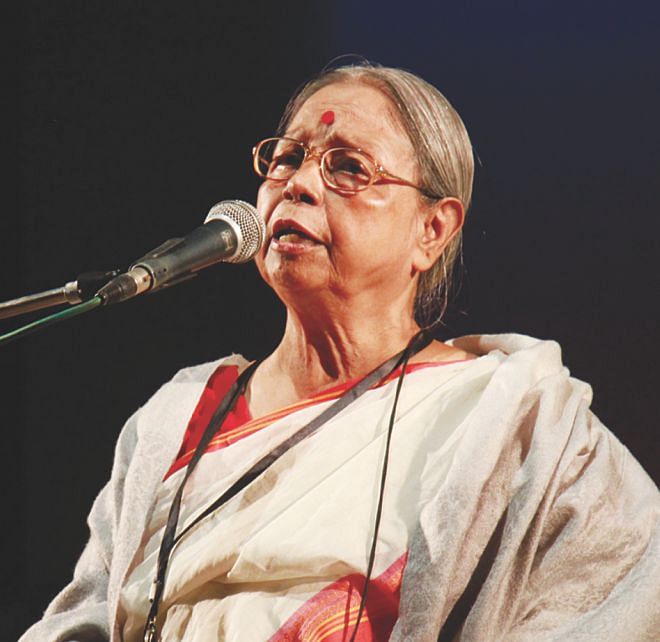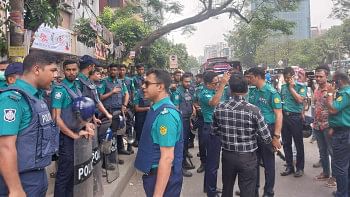A cornerstone of a cultural lighthouse

Deshikottom Dr. Sanjida Khatun needs no introduction to anyone familiar to Bangladesh's cultural fraternity. An eminent Tagore exponent and researcher, cultural activist, and one of the founders of Bangladesh Mukti Sangrami Shilpi Sangstha (during the Liberation War) and Chhayanaut, she is one of the most respected names in the country's cultural scene. On the occasion of the Golden Jubilee of the Chhayanaut Sangeet Bidyayatan, she spoke to The Daily Star about the history, journey and vision of what is today one of the most prominent school of cultural education in the country.
“The reason we started the Sangeet Bidyaytan (music school) was to bring up and nurture new artistes. We saw that there weren't many artistes in the country; we had a monthly musical programme named 'Shrota'r Ashor', and it was difficult to find quality artistes for it. So, Waheedul Haq came up with the proposal of starting a school. We were apprehensive about how we would bear the expenses and everything, but he said there was no alternative to it. He wanted to create a platform for the practice of the arts. And he sort of insisted to the committee to start the school. Everyone decided to give a monthly donation, and along with small fees from students, the school would run.
“At that time, there were musicians on the radio, who would accompany the singers. Nobody really knew the extent of their skills. There was a violinist, who everyone called Moti Mia. Waheedul Haq brought him here, promising him a big sum more than he earned there, to be the principal. There was a tabla artiste from the radio named Bazlul Karim, who taught tabla, and also accompanied during other classes. I was in charge of Rabindra Sangeet, and we brought in Sohrab Hossain for Nazrul Sangeet.
“Moti Mia was not just a violinist, but knew a lot about Ragas, and he could sing. So he started teaching classical, I took over Rabindra Sangeet and Sohrab bhai taught Nazrul Sangeet, and we started the school on the second floor of Bangla Academy. But it was inaugurated at the English preparatory school (Now Udayan School), by Ustad Ayet Ali Khan, eminent Surbahar player, and Shilpacharya Zainul Abedin.
“We could not stay at any location for long, because of various reasons. After liberation, the erstwhile VC of Dhaka University allowed us to continue at the University Laboratory School, where we operated for a long time. When Sheikh Hasina -- who was a student of violin at the school for a brief period -- became prime minister, she was a guest at an alumni reunion, and she gave us a piece of land at a token price. And when the building was established, it was done by Chhayanaut, but it had contributions from us at the Sangeet Bidyaytan as well. We did not draw any salary from it; only a few people did, whose livelihoods depended on it. Thus, the fund of the school grew. At that time, there were not many students, and their monthly fees was also very little. Today, Chhayanaut Sangeet Bidyaytan has about four thousand students. Before, we had classes twice a week, but now, at Chhayanaut's own building, we have classes five days a week. We have also expanded our programmes greatly.
“But our school has never been just about music. We've taught then manners, behaviour, and Bangalittwo. We have a dress code. Girls wear sarees and boys wear panjabi. They wear whatever throughout the rest of the week, but just this routine of attire has an impact on them. And we want to have that impact of infusing the spirit of Bangalittwo. We have a song 'Manush Ho, Manush Ho, Abar Tora Manush Ho; Onukoron Kholosh-Bhedi Kayemone Bangali Ho'; we hold this song very close to our hearts.
“Another special thing about this school is it is being run by its former students. Many of our teachers of various disciplines have all passed from this very school; even many who are working in other wings of Chhayanaut are former students. This school has contributions from its teachers and its students alike. And we're all connected together. It's true that since now it's become such a big institution, it's not possible to be as tightly-wound as before.
“It's definitely a great feeling to have achieved so much, and produced so many fantastic artistes. But we still have a long way to go. We know our girls will go to their husband's families; our boys will go to all parts of the country, and abroad. And they will spread their music and art there. Culture is a great tool to enlighten minds. And through the Sangeet Bidyaytan, that is what we are trying to achieve; enlightenment, emancipation and empowerment of minds.”

 For all latest news, follow The Daily Star's Google News channel.
For all latest news, follow The Daily Star's Google News channel. 



Comments